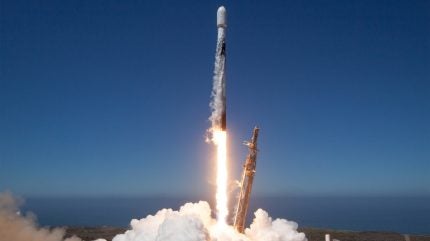
A new military spy satellite for the UK Ministry of Defence (MoD) has been launched and placed into orbit by US space access provider SpaceX, the first in a series of new intelligence, surveillance, and reconnaissance (ISR) capabilities being developed under the Istari programme.
Dubbed Tyche, the first of the four research and development satellites was launched on 16 August 2024, according to a UK government release, which was coupled with social media postings by the UK MoD and its Defence Equipment & Support (DE&S) arm, as well as posts from SpaceX.
Commissioned by UK Space Command, Tyche was procured by DE&S’ Space Delivery Team from Surrey Satellite Technology (SSTL) and is the first wholly UK MoD-owned satellite.
As manufacturer, SSTL chooses the satellite delivery method, in this case opting for SpaceX. The Tyche spy satellite contains a daytime electro-optical camera to provide high resolution images for use by the UK military.
Posting on LinkedIn, the UK MoD said that the research and development satellite Tyche, which will be operational until 2029, will be followed into orbit by three further R&D satellites, named Juno, Oberon, and Titania.
SpaceX, owned by Elon Musk, posted on the X social media channel, also owned by Musk, in the early hours of 17 August that a Falcon 9 rocket had launched 166 spacecraft into orbit, the company’s 375th mission of its kind.

US Tariffs are shifting - will you react or anticipate?
Don’t let policy changes catch you off guard. Stay proactive with real-time data and expert analysis.
By GlobalDataDesigned and built in the UK through a £22m ($28.5m) contract awarded by DE&S to SSTL, Tyche is the first military satellite to be fully owned by the UK MoD.
SSTL received the first signals from Tyche – which is comparable in size to a washing machine and weighs 150kg – a few hours after lift-off, confirming the successful launch, the UK government said.
UK Space Commander, Major General Paul Tedman said: “This is a fabulous day for UK space. The successful launch of Tyche has shown that UK Space Command… can rapidly take a concept through to the delivery of a satellite capability on orbit.”
Tyche was launched from Vandenberg Space Force Base, California, by SpaceX, on its re-usable Falcon 9 rocket, as part of the ‘Transporter 11’ mission.
UK developing future military satellite constellations
Announced in 2022 under the previous Conservative government, the £968m Istari programme is planned to deliver a multi-satellite constellation to provide global surveillance capabilities for the UK military.
The Istari programme is separate from the UK MoD’s Skynet 6 military satellite communications effort, which will provide an upgrade to the current Skynet 5 constellation currently in service.
With the twin constellation of Skynet 6 and the future Istari capability, the UK will have a network of space-based communications and surveillance assets to further situational awareness.
Tied in with this will be the future DARC ground-based space domain awareness sensor network, part of the AUKUS initiative, which will enable UK sensing of space-based threats far out into high Earth orbit.
The UK military already operates a capable ground-based space surveillance capability at RAF Fylingdales in North Yorkshire, which is part of a US-led space domain awareness and ballistic missile defence network.
One element of space infrastructure that the UK currently lacks is the ability to place satellites into orbit from the UK itself, with long-planned commercial spaceports still under development.
Two sites, Spaceport Sutherland and SaxaVord, are currently in the latter space of completion in Scotland, with the latter expected to perform an orbital test flight in the autumn of 2024.


